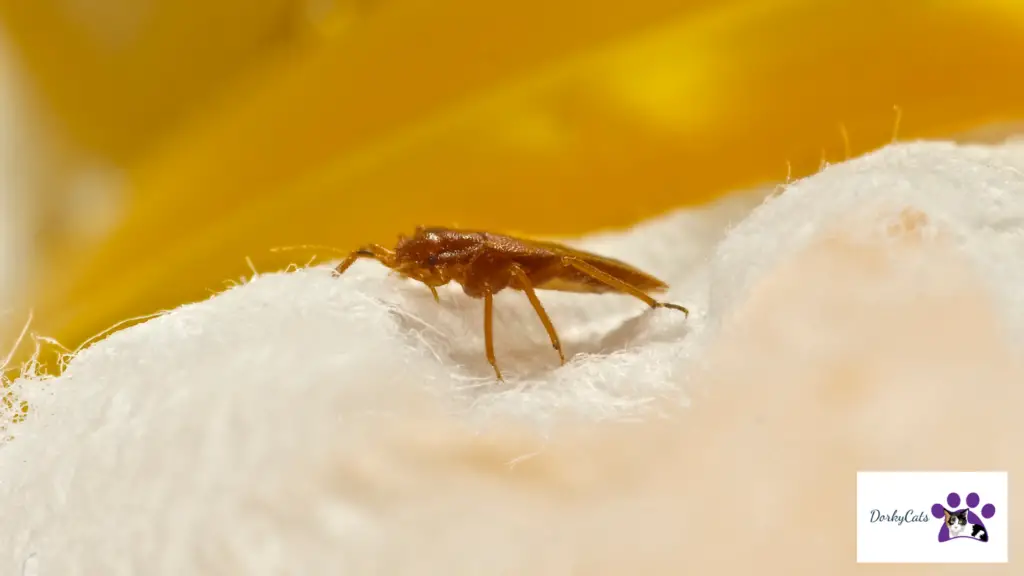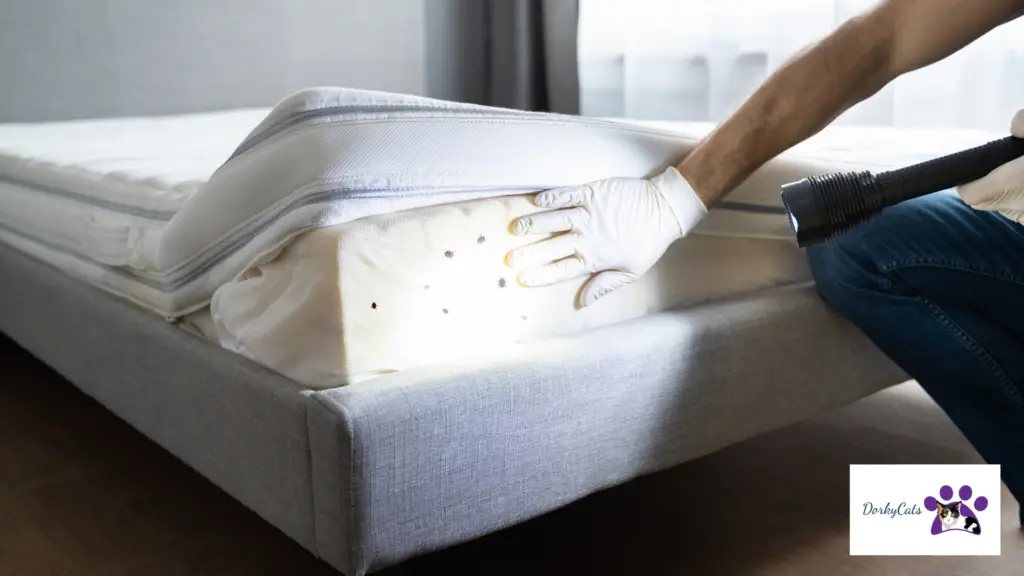CAN CATS CARRY BED BUGS? 5+ REMEDIES
Can cats carry bed bugs? If you suspect bed bug problems, you might wonder if your cat is at risk too. Fortunately, your cat is not necessarily carrying those small animals.
While bed bugs can feed on cats and people, they usually are not residing on your cat fur. Thus, it is unusual for cats to carry them. However, while it is uncommon for cats to carry bed bugs, it is still possible in some rare circumstances.
Let’s see how to deal with bed bugs when cats are around.

WHAT IS A BED BUG?
A bed bug is a tiny, wingless insect that feeds on the blood of animals and humans. Adult bed bugs are about the size and shape of an apple seed, with flat, reddish-brown bodies that are roughly oval.
They are typically active at night when they emerge from hiding places to feed on sleeping humans or animals.
Bed bugs are not known to transmit diseases to humans, but they can cause skin irritation, itching, and allergic reactions in some people. In addition, infestations can be difficult to detect and even more challenging to get rid of, as bed bugs can hide in cracks and crevices in walls, furniture, and bedding.

Bed bugs can spread through human and animal transport, such as clothing, luggage, or pets. They can also be introduced into homes and buildings on used furniture, bedding, or other household items.
Suppose you suspect that you have a bed bug infestation in your home. In that case, contacting a pest control professional is essential to help eliminate the infestation and prevent it from spreading.
CAN CATS CARRY BED BUGS?
Cats can carry bed bugs just like any other animal or human, but it is unlikely that a bed bug will reside on cats or other pets. They leave their hiding to look for food, and once they bite, they return to the usual place.
Bed bugs are small, wingless insects that can easily hitch a ride on clothing, bedding, and pets. While bed bugs don’t typically live on pets, they can hide in their fur and be transported from one location to another.
If you suspect that your cat may have been in contact with bed bugs, it’s important to immediately prevent an infestation from spreading. Here are some steps you can take:
- Inspect your cat’s bedding and sleeping areas for signs of bed bugs, such as small bloodstains, molted skins, or tiny black fecal spots.
- Give your cat a thorough bath using a pet-friendly shampoo to help remove any bed bugs hiding in their fur.
- Vacuum your home thoroughly, paying close attention to areas where your cat spends a lot of time, such as carpets, rugs, and furniture.
- Wash your cat’s bedding and any other linens or clothing that may have come into contact with bed bugs in hot water and dry on high heat.
- Consider contacting a professional pest control company to help eliminate bed bug infestations in your home.
By taking these steps, you can help protect your cat and your home from bed bugs and prevent the spread of an infestation.
Some ideas of shampoo you can use:
Table could not be displayed.CAN BED BUGS LIVE IN CAT LITTER?
Bed bugs are not known to infest cat litter, as they typically prefer to hide in cracks and crevices near where humans sleep, such as mattresses, bed frames, and headboards. Bed bugs are also unknown to live on or inside animals, including cats.
However, bed bugs can be transported in or on cat litter near an infested area. In addition, bed bugs can hitch a ride on clothing, bedding, or other materials and be carried from one location to another.
If you suspect your home has a bed bug infestation, it’s essential to eliminate the problem as soon as possible. This may involve hiring a pest control professional to treat the affected areas with insecticides or other methods.
When handling cat litter or other pet-related items, wearing gloves and taking precautions to avoid spreading any potential bed bugs is a good idea.
Washing pet bedding and other items in hot water and drying them on high heat can also help kill any bed bugs that may be present.
WHERE DO BED BUGS COME FROM?
Bed bugs are believed to have originated in the Middle East, but they can now be found worldwide. They are often associated with unsanitary living conditions, but bed bugs can infest even the cleanest of homes and hotels.
Bed bugs are excellent hitchhikers and can be transported from one location to another on clothing, luggage, bedding, and other materials. They can also be introduced into homes and buildings on used furniture or other household items.
In recent years, bed bug infestations have become more common, and it’s believed that increased international travel and the decreased use of certain insecticides have contributed to their resurgence.
Bed bugs are notorious for being difficult to detect and even more challenging to eliminate, making them a persistent problem for many homeowners and renters.
HOW TO GET RID OF BED BUGS ON CATS?

Bed bugs do not typically infest cats or other pets, as they prefer to feed on human blood. However, bed bugs can be transported on a cat’s fur or bedding, and they may bite the cat if they cannot find a human host.
If you suspect that bed bugs may have bitten your cat, it’s essential to take steps to eliminate the infestation in your home. In the meantime, you can take the following steps to help protect your cat:
- Bathing your cat with a mild pet shampoo can help remove any bed bugs hiding in their fur.
- Vacuum your home thoroughly.
- Wash your cat’s bedding and any other pet-related items in hot water and dry on high heat to help kill any bed bugs that may be present.
- Use a flea comb to remove bed bugs in your cat’s fur.
- Consult with your veterinarian: If your cat is experiencing skin irritation or other symptoms due to bed bug bites, you may want to consult your veterinarian for additional treatment options.
It’s important to note that while bed bugs can bite cats and other pets, they cannot infest them like they infest homes and furniture.
Eliminating bed bugs from your home is the most effective way to protect your cat and your family from these pests.
CAN CATS CARRY BED BUG EGGS?
Cats can carry bed bug eggs on their fur, bedding, or other items. Bed bug eggs are tiny and white and are often found in the crevices and seams of furniture, bedding, and other items in the home.
If a cat comes into contact with bed bug-infested items, it may pick up bed bug eggs on its fur, which can then be transferred to other areas of the home.
It’s important to note that bed bug eggs are less likely to be found on cats than on other items in the home, such as clothing, bedding, and furniture. This is because bed bugs prefer to lay their eggs in areas where they can easily access a blood meal, such as in the seams of a mattress or upholstered furniture.
CAN CATS KILL BED BUGS?
Cats are natural hunters and may be able to catch and kill individual bed bugs, especially if they are active at night when bed bugs are most active. However, cats are unlikely to be an effective method of controlling a bed bug infestation.
Bed bugs can quickly spread throughout a home and hide in cracks, crevices, and other hard-to-reach areas, making it difficult for even the most skilled hunter to eliminate the infestation.
CAN BED BIGS BITE CATS?
Bed bugs can bite cats, although they generally prefer to feed on humans. Bed bugs feed on the blood of warm-blooded animals, including cats, dogs, and humans.
They typically feed at night, when their hosts are sleeping, and their bites can cause itching, redness, and other skin reactions.
HOW TO GET RID OF BED BUGS?
Getting rid of bed bugs can be a difficult and time-consuming process and may require the help of a professional pest control company. However, here are some steps you can take to help eliminate a bed bug infestation:
- Identify the infested areas: Look for signs of bed bugs, such as live bugs, shed skins, bloodstains, and fecal matter on your bedding, furniture, or other items in your home.
- Vacuum thoroughly: Vacuum your home thoroughly, paying special attention to areas where bed bugs are likely to hide, such as the seams of mattresses, box springs, and furniture.
- Launder-infested items: Wash bedding, clothing, and other washable items in hot water and dry them on high heat to kill bed bugs and their eggs.
- Use bed bug traps: Bed bug traps can help detect and trap bed bugs, making monitoring and controlling the infestation easier.
- Treat infested areas with insecticides: Insecticides can effectively kill bed bugs and their eggs but should be used cautiously and only according to the instructions on the label.
- Consider professional treatment: If the infestation is severe, you may need to hire a professional pest control company to treat your home with specialized insecticides and other methods.
It’s important to be persistent and thorough in eliminating a bed bug infestation, as even a few surviving bed bugs can quickly re-infest your home.
WHAT TO DO WITH PETS DURING BED BUG TREATMENT?
During bed bug treatment, it’s important to take steps to protect your pets from exposure to insecticides and other chemicals.
Here are some tips for managing your pets during bed bug treatment:
- First, remove your pets from the treatment area: If possible, remove your pets from the treatment area for the duration of the treatment. This may involve temporarily relocating them to another room or a friend’s house.
- Follow instructions from the pest control company: If you’re using a professional pest control company, follow their instructions for pet safety during the treatment. This may involve removing food and water bowls, toys, and bedding from the treatment area and covering aquariums or cages with plastic sheeting.
- Keep pets away from treated areas: After the treatment is complete, keep your pets away from treated areas until the insecticides have had a chance to dry and the room has been thoroughly ventilated.
- Consult with your veterinarian: If you have concerns about your pet’s safety during bed bug treatment, consult with your veterinarian for advice on protecting your pet.
It’s important to remember that different types of insecticides may have different toxicity levels for pets. Hence, following instructions carefully and using caution when using these products in your home is essential.
FREQUENTLY ASKED QUESTIONS
Can stray cats carry bed bugs?
It is doubtful that stray cats carry bed bugs. This is because bed bugs used to reside inside the house. However, stray cats can have other types of fleas or bugs.
Can cats smell bed bugs?
Cats can smell the very distinctive odor of bed bugs. In addition, cats have very refined senses and can perceive the presence of those small animals even before humans do.







![MY CAT IS SO SKINNY I CAN FEEL THE BONES [WHEN TO BE WORRIED?]](https://dorkycats.com/wp-content/uploads/2023/02/Blogging-Tips-LinkedIn-Post-Header-42-768x432.png)